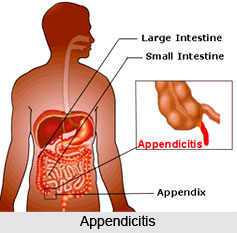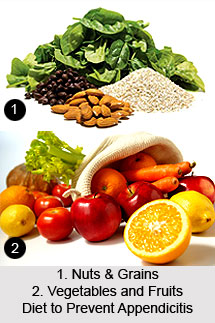 Appendicitis is the most common of all the serious intestinal diseases, since it causes an inflammation of the vermiform appendix. The function of the appendix, which is performed by this lymphoid tissue, is to neutralize the irritating waste material generated in the body or the organic poisons introduced through the skin or membranes. It affects both the sexes in acute as well as chronic forms. This disease now accounts for about half the acute abdominal emergencies occurring between the ages of 10 to 30, however this disease is quite frequent in developed countries than the underdeveloped ones.
Appendicitis is the most common of all the serious intestinal diseases, since it causes an inflammation of the vermiform appendix. The function of the appendix, which is performed by this lymphoid tissue, is to neutralize the irritating waste material generated in the body or the organic poisons introduced through the skin or membranes. It affects both the sexes in acute as well as chronic forms. This disease now accounts for about half the acute abdominal emergencies occurring between the ages of 10 to 30, however this disease is quite frequent in developed countries than the underdeveloped ones.
Symptoms of Appendicitis:
Appendicitis usually begins with a sudden pain in the centre of the abdomen, gradually shifting to the lower right side. The pain increases on the right side on pressing the left side of the abdomen. With the pain, there can be other discomforts like indigestion, diarrhoea, in the abdomen, indigestion, diarrhoea or constipation along with severe coughing and sneezing. The patient usually also has a mild fever varying from 100 to 102F along with nausea or vomits. Even the muscles of the right side of the abdomen become tense and rigid. The patient draws some comfort by drawing up the right leg. However, if the inflammation continues to increase, the appendix may rupture and discharge its pus into the abdominal cavity. This may result in a serious state known as peritonitis, wherein the body temperature rises making the patient pale and cold. In the chronic state of appendicitis, the patient may suffer from recurrent pain in the right lower abdomen with constipation, loss of appetite and mild nausea. However, if the patients face the greater level of difficulty, it is better to act immediately and show them to a medical practitioner.
Causes of Appendicitis:
Appendicitis is caused by a toxic bowel condition. Whenever excessive amount of poisonous waste materials get accumulated in the caecum, the appendix being irritated and over-worked gets inflamed. This condition is brought about by wrong feeding habits and enervation of the system. Inflammation of the bowel lining, due to the habitual use of apparent drugs, is a potent predisposing factor in the development of appendicitis. Further inflammation and infection comes from certain germs, which are usually present in the intestinal tract.
Treatment of Appendicitis by Nature Cure:
•As soon as the symptoms of severe pain, vomiting and fever persist, the patient should be put to bed immediately, since rest is of utmost importance in the treatment of this disease.
•The patient should resort to fasting, whereby nothing except water should be given to the patient; this treatment is the only real cure for appendicitis.

•Even low enemas, containing about one pint of warm water should be administered every day, atleast for the first three days to cleanse the lower bowel.
•Hot compresses may be placed over the painful area several times daily.
•Abdominal packs, made of a strip of wet sheet covered by a dry flannel cloth bound tightly around the abdomen, should be applied continuously until all acute symptoms subside.
•When the acute symptoms subside by about the third day. The patient should be given a full enema, containing about IRH litre of warm water and this should be repeated daily until all inflammation and pain have subsided.
•The patient can be given fruit juices from the third day onwards.
This simple treatment sensibly applied will overcome an appendicitis attack. After spending three days on fruit juices, the patient can also stick to an all-fruit diet for further four or five days, during which, all his three meals should contain only fresh juicy fruits. Thereafter, he should adopt a well-balanced diet based including seeds, nuts & grains, vegetables and fruits. Certain vegetable juices, especially carrot juice, in combination with the juices of beets and cucumbers, are also considered valuable in the treatment of appendicitis. Regular use of tea made from fenugreek seeds has also proved helpful in preventing the appendix.
In case of chronic appendicitis, a short fast should be followed by a full milk diet for two to three weeks, wherein:
•First Day: 1 glass of milk should be taken every two hours from 8 a.m. to 8 p.m.
•Second Day: 1 glass every hour and a half
•Third Day: 1 glass every hour.
•After the full milk diet, the patient should gradually start a well balanced diet, with emphasis on fresh fruits and green leafy vegetables.
If the patient of appendicitis is habituated with constipation, then he should infact deal with eradicating the same by the application of hot fomentation and abdominal packs every morning and night along with an abdominal massage. Once the waste matter in the caecum has moved in to the colon and eliminated, the irritation and inflammation in the appendix will subside and surgical removal of the appendix will not be necessary. The surgical operation should be resorted to only in rare cases, when the appendix has become abscessed.




